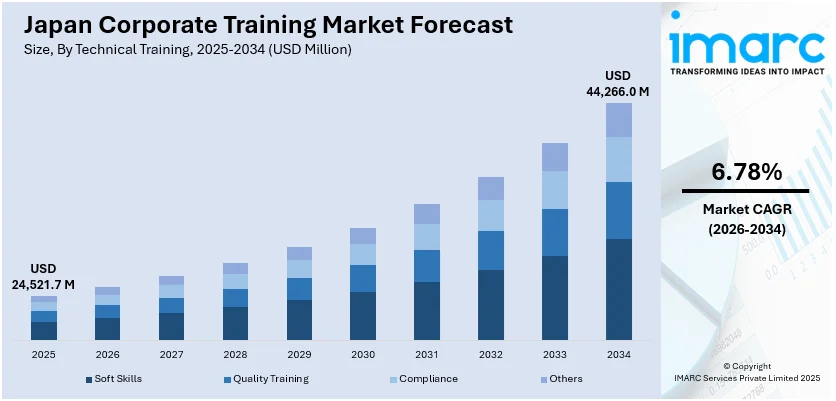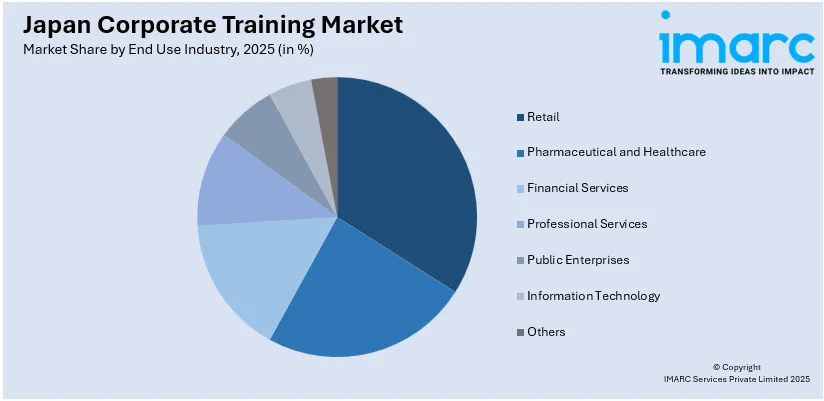
Japan Corporate Training Market Size, Share, Trends and Forecast by Technical Training, End Use Industry, and Region, 2026-2034
Japan Corporate Training Market Overview:
The Japan corporate training market size reached USD 24,521.7 Million in 2025. Looking forward, IMARC Group expects the market to reach USD 44,266.0 Million by 2034, exhibiting a growth rate (CAGR) of 6.78% during 2026-2034. The market is growing due to rapid digital transformation, creating demand for AI and tech-related upskilling. Government initiatives such as "Society 5.0" further accelerate this trend. Additionally, workforce aging and globalization drive the need for soft skills and leadership development. Remote work expansion and labor shortages also push companies to invest in employee retention and continuous learning programs, further augmenting the Japan corporate training market share.
|
Report Attribute
|
Key Statistics
|
|---|---|
|
Base Year
|
2025 |
|
Forecast Years
|
2026-2034
|
|
Historical Years
|
2020-2025
|
| Market Size in 2025 | USD 24,521.7 Million |
| Market Forecast in 2034 | USD 44,266.0 Million |
| Market Growth Rate 2026-2034 | 6.78% |
Japan Corporate Training Market Trends:
Rising Demand for Digital and AI Skills Training
The market is experiencing a rise in demand for digital and AI-related skills development. As businesses accelerate digital transformation, companies are prioritizing upskilling employees in areas such as data analytics, cybersecurity, and artificial intelligence. The rapid adoption of automation and generative AI tools has created a skills gap, prompting organizations to invest in specialized training programs. Many firms are partnering with e-learning platforms and tech providers to deliver flexible, on-demand courses that cater to diverse learning needs. Additionally, the Japanese government’s push for a "Society 5.0" initiative, a vision for a tech-driven future, further fuels this trend. Japan's Society 5.0 project aims to address societal problems through the use of cutting-edge technologies such as big data, artificial intelligence, and the Internet of Things to create a highly intelligent, sustainable society. This initiative, in consonance with the United Nations' Sustainable Development Goals, is initiating considerable investment in digital infrastructure, as the government is increasing its expenditure on science and technology to more than USD 38 Billion. This change provides opportunities for corporate training, especially in digital skills, to help the changing workforce of smart cities and sectors. Companies recognize that staying competitive requires a workforce proficient in emerging technologies, leading to higher investments in continuous learning and certification programs. This shift is reshaping corporate training strategies, with a stronger emphasis on practical, hands-on learning over traditional classroom-based methods.

To get more information on this market Request Sample
Growth of Soft Skills and Leadership Development Programs
The growing focus on soft skills and leadership development is significantly supporting the Japan corporate training market growth. With an aging workforce and increasing globalization, companies are prioritizing communication, emotional intelligence, and cross-cultural collaboration skills. The rise of hybrid and remote work models has further highlighted the need for effective virtual leadership and team management training. A 2024 survey in Japan showed that 51.2% of workers have access to remote work options, with 27.4% working remotely on a regular basis. Additionally, 57.2% believe that remote work will continue to be around in the future, and 41.5% prefer a hybrid work model. This growing demand for flexible work arrangements indicates the need for corporate training programs to equip workers with the competencies necessary for success in remote and hybrid work environments. Many organizations are incorporating coaching, mentorship, and experiential learning into their programs to cultivate future-ready leaders. Additionally, as Japan faces labor shortages, retaining top talent has become critical, prompting firms to invest in employee engagement and career development initiatives. Training providers are responding by offering customized workshops, gamified learning experiences, and assessments to measure competency growth. This trend reflects a broader shift toward holistic employee development, where technical expertise is complemented by strong interpersonal and adaptive leadership skills to drive long-term business success.
Japan Corporate Training Market Segmentation:
IMARC Group provides an analysis of the key trends in each segment of the market, along with forecasts at the country and regional levels for 2026-2034. Our report has categorized the market based on technical training and end use industry.
Technical Training Insights:
- Soft Skills
- Quality Training
- Compliance
- Others
The report has provided a detailed breakup and analysis of the market based on the technical training. This includes soft skills, quality training, compliance, and others.
End Use Industry Insights:

Access the comprehensive market breakdown Request Sample
- Retail
- Pharmaceutical and Healthcare
- Financial Services
- Professional Services
- Public Enterprises
- Information Technology
- Others
A detailed breakup and analysis of the market based on the end use industry have also been provided in the report. This includes retail, pharmaceutical and healthcare, financial services, professional services, public enterprises, information technology, and others.
Regional Insights:
- Kanto Region
- Kansai/Kinki Region
- Central/ Chubu Region
- Kyushu-Okinawa Region
- Tohoku Region
- Chugoku Region
- Hokkaido Region
- Shikoku Region
The report has also provided a comprehensive analysis of all the major regional markets, which include Kanto Region, Kansai/Kinki Region, Central/ Chubu Region, Kyushu-Okinawa Region, Tohoku Region, Chugoku Region, Hokkaido Region, and Shikoku Region.
Competitive Landscape:
The market research report has also provided a comprehensive analysis of the competitive landscape. Competitive analysis such as market structure, key player positioning, top winning strategies, competitive dashboard, and company evaluation quadrant has been covered in the report. Also, detailed profiles of all major companies have been provided.
Japan Corporate Training Market News:
- August 29, 2024: Brinc Japan launched a new reskilling program in partnership with Scalably and Keio University's Regional Mirai Project to meet the IT professional shortage in Japan and drive business innovation. The initiative covers topics ranging from the use of AI, ESG principles, Web3 technologies, and corporate venture capital, aiming to upskill employees from different industries. Supported by a Ministry of Health, Labour, and Welfare subsidy, the program seeks to help companies develop the human talent needed for business growth and decarbonization strategies.
Japan Corporate Training Market Report Coverage:
| Report Features | Details |
|---|---|
| Base Year of the Analysis | 2025 |
| Historical Period | 2020-2025 |
| Forecast Period | 2026-2034 |
| Units | Million USD |
| Scope of the Report | Exploration of Historical Trends and Market Outlook, Industry Catalysts and Challenges, Segment-Wise Historical and Future Market Assessment:
|
| Technical Trainings Covered | Soft Skills, Quality Training, Compliance, Others |
| End Use Industries Covered | Retail, Pharmaceutical and Healthcare, Financial Services, Professional Services, Public Enterprises, Information Technology, Others |
| Regions Covered | Kanto Region, Kansai/Kinki Region, Central/ Chubu Region, Kyushu-Okinawa Region, Tohoku Region, Chugoku Region, Hokkaido Region, Shikoku Region |
| Customization Scope | 10% Free Customization |
| Post-Sale Analyst Support | 10-12 Weeks |
| Delivery Format | PDF and Excel through Email (We can also provide the editable version of the report in PPT/Word format on special request) |
Key Questions Answered in This Report:
- How has the Japan corporate training market performed so far and how will it perform in the coming years?
- What is the breakup of the Japan corporate training market on the basis of technical training?
- What is the breakup of the Japan corporate training market on the basis of end use industry?
- What is the breakup of the Japan corporate training market on the basis of region?
- What are the various stages in the value chain of the Japan corporate training market?
- What are the key driving factors and challenges in the Japan corporate training market?
- What is the structure of the Japan corporate training market and who are the key players?
- What is the degree of competition in the Japan corporate training market?
Key Benefits for Stakeholders:
- IMARC’s industry report offers a comprehensive quantitative analysis of various market segments, historical and current market trends, market forecasts, and dynamics of the Japan corporate training market from 2020-2034.
- The research report provides the latest information on the market drivers, challenges, and opportunities in the Japan corporate training market.
- Porter's five forces analysis assist stakeholders in assessing the impact of new entrants, competitive rivalry, supplier power, buyer power, and the threat of substitution. It helps stakeholders to analyze the level of competition within the Japan corporate training industry and its attractiveness.
- Competitive landscape allows stakeholders to understand their competitive environment and provides an insight into the current positions of key players in the market.
Need more help?
- Speak to our experienced analysts for insights on the current market scenarios.
- Include additional segments and countries to customize the report as per your requirement.
- Gain an unparalleled competitive advantage in your domain by understanding how to utilize the report and positively impacting your operations and revenue.
- For further assistance, please connect with our analysts.
 Request Customization
Request Customization
 Speak to an Analyst
Speak to an Analyst
 Request Brochure
Request Brochure
 Inquire Before Buying
Inquire Before Buying




.webp)




.webp)












